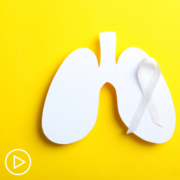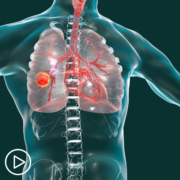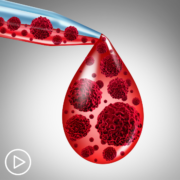Understanding Currently Available Non-Small Cell Lung Cancer Treatments
Understanding Currently Available Non-Small Cell Lung Cancer Treatments from Patient Empowerment Network on Vimeo.
What options are available to treat non-small cell lung cancer? Dr. Erin Schenk, a lung cancer specialist and researcher, defines personalized medicine for the audience and discusses lung cancer treatment options, including clinical trials.
Dr. Erin Schenk is a medical oncologist, lung cancer researcher, and assistant professor in the division of medical oncology at the University of Colorado Anschutz Medical Center. Learn more about Dr. Schenk.
See More From INSIST! Lung Cancer
Related Resources:

An Expert Explains Predictive Biomarker Testing for Lung Cancer |

|

Personalized Lung Cancer Treatment | Key Factors to Consider |
Transcript:
Katherine Banwell:
We’re hearing the term personalized medicine a lot these days. Would you define the term for our audience?
Dr. Erin Schenk:
Absolutely, and I think the treatment of non-small cell lung cancer is one of the poster childs for children – for personalized medicine because based on the result of the biomarker testing that’s what drives my choice of therapy because the biomarkers help to tell me what is this cancer most likely to be vulnerable to and that in my mind that’s a wonderful application of the promise of personalized medicine.
Katherine Banwell:
Okay. Let’s move on to treatment now, Dr. Schenk. Would you walk us through the current treatments being used to treat non-small cell lung cancer?
Dr. Erin Schenk:
Absolutely, and there are a broad range of options, and thankfully we have so many choices in how to best help patients. And it’s often why visiting with a center that sees a lot of patients with lung cancer can be beneficial so that you have all of the parties at the table that need to be there as we’re making these treatment decisions. So, I would start thinking about patients with early-stage disease. Often surgery if tumors are small enough and there’s not you know, no lymph nodes are involved with the cancer and it’s not anywhere else.
Sometimes surgery is all that patients might need in terms of their treatment. Those are for patients with smaller tumors and really early-stage disease. As we move forward in the stages, meaning going from stage one to stage two, so a little bit bigger of a tumor, lymph nodes might be involved.
That’s when really the multi-disciplinary approach happens, and what I mean by that is for example, at my institution where people like me, medical oncologists, radiation oncologists, and surgeons all sit down together to talk about a patient, their scans, you know, what is their health status, what is their biomarker testing, to try to come together to form a treatment approach. And so, at our institution, you know, frequently in stage two to stage three tumors based on biomarker testing we either select upfront surgery followed by chemotherapy followed by sometimes targeted therapies or TKIs.
Those are the medicines, the TKI, those are the medicines that are really dependent on the presence of biomarker testing. So, the biomarkers often tell us for example if there’s an EGFR mutation. If that’s present then I would use an EGFR TKI, for example.
But if those biomarkers don’t show an alteration where I have TKI to use, then we frequently are giving patients chemotherapy plus immunotherapy before surgery. This approach is called a neoadjuvant chemoimmunotherapy approach, and it’s one of the newer changes to lung cancer care within the past year that I think really is going to have a positive impact on outcomes for patients with lung cancer.
So, just again in broad strokes, and then as we move into stage three patients where we can’t resect the tumor, that’s where we give chemotherapy medicines plus radiation therapy. Oftentimes followed by immunotherapy and then when patients have disease that spread outside of the chest, outside of the lungs, the metastatic setting or stage IV, that’s when we think about the whole host of therapies available through medical oncology, systemic therapies is another way to call them.
And there we think about immunotherapy-based treatments plus or minus chemotherapy or we think about targeted therapy-based approaches with those TKIs. And again, it’s all based on those molecular markers, those biomarkers.
Katherine Banwell:
Do clinical trials play a role in lung cancer treatment?
Dr. Erin Schenk:
Clinical trials are incredibly important for the treatment of lung cancer. These are the tests and the procedures that we do that have continuously advanced our ability to care for patients with lung cancer. You know, it was clinical trial data that helped us get alerted to doing chemotherapy and immunotherapy before surgery really can help patients do better. And similarly, clinical trials have helped us define when do we use TKIs or targeted therapies.
So, I think that’s another great question to ask your team of, “Based on all of the information you know about me and my cancer are there clinical trials options that are available here where I’m at or ones that are really interesting or appealing elsewhere that might be worthwhile for me to consider?” So, clinical trials are a critical part of how we help patients do better.






![[ACT]IVATED SCLC Resource Guide [ACT]IVATED SCLC Resource Guide](https://powerfulpatients.org/wp-content/uploads/ACTIVATED-Prostate-Cancer-Resource-Guide-1-180x180.png)



